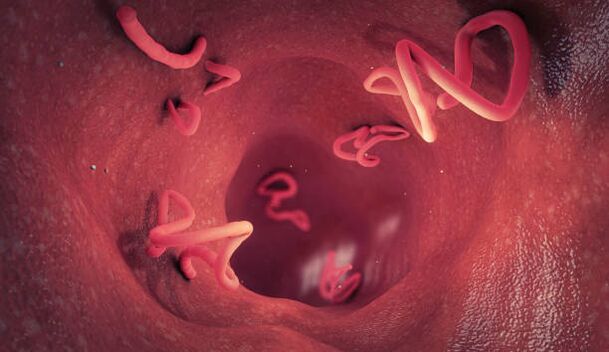Human parasitic diseases (from the Greek parasitos - "parasite") are a large group of diseases of the section "infectious diseases", the cause of which is unicellular and multicellular parasites.

A parasite is a living organism that lives or is in the body of the host and receives food from the host or at their expense, that is, it leads a parasitic lifestyle. All of them know how to live in the human body, some completely imperceptibly, and some can cause serious damage to health.
Agents responsible for parasitic diseases
There are three main classes of parasites that can cause disease in humans:
Protozoa are microscopic single-celled organisms that can be free or parasitic in nature. They are able to reproduce in humans, which contributes to their survival, and also allows the development of serious infections from a single organism.
Helminths (from the Greek helmines - "worms") are large, multicellular organisms that are usually visible to the naked eye in the adult stage. Like protozoa, helminths can be free or parasitic in nature. In their adult form, helminths cannot reproduce in humans.
Ectoparasites: This term is generally used more narrowly to refer to organisms such as ticks, fleas, and lice that attach or hide in the skin and stay there for a long time (from a few weeks to several months). Arthropods can cause infection on their own, and can be carriers of other diseases.
List of parasitic infections: amebiasis, ascariasis, hymenolepiasis, diphyllobothriasis, clonorchiasis, cryptosporidiosis, giardiasis, malaria (imported cases), opisthorchiasis, tapeworms, tapeworms, toxocarosis, toxoplasmosis, trichinosis, trichocytocytocytosis, cystocytocytosis, cystocytocytosis, cystocytocytosis.
Signs of parasitic diseases.
Their manifestations can be varied and depend on the type and location of the parasite, as well as the level of immunity of the person who is their host.
Protozoa most often cause diarrhea and other gastrointestinal symptoms. Helminth infections can cause abdominal pain, diarrhea (diarrhea), muscle pain, cough, skin damage, malnutrition, weight loss, impaired coordination of movement and speech, seizures and many other symptoms, depending on the person and the severity of the infection.
Diagnosis and treatment of parasitic diseases
Diagnosis of parasitic diseases includes:
- Clinical blood test.
- Blood test for specific antibodies and parasitic antigens.
- Blood smear.
- Analysis of feces for eggs of worms and parasites.
- Endoscopic research methods (for example, colonoscopy, in the case of complex diagnoses).
- X-ray, magnetic resonance imaging (MRI), computed tomography (CT) for severe damage to internal organs by parasites.
The treatment plan will depend on the specific diagnosis. As a rule, drugs are prescribed in the form of tablets, sometimes hospital treatment is required, up to surgery.
Other treatments may also be recommended to relieve your symptoms (diet, water intake).
Prevention of parasitic diseases
Prevention is always easier than cure, and there are simple ways to protect yourself.
Do not eat:
- undercooked fish, crabs and shellfish;
- undercooked meat;
- raw aquatic plants;
- raw vegetables which may have been contaminated by human or animal excreta.
Parasites can live in natural water sources, so while swimming:
- do not swallow water;
- prevent babies from defecating in the water, take babies to the toilet and check diapers every hour, change diapers in the bathroom or in the changing room rather than by the pool to preventgerms do not get into the pool
- do not swim or let children swim if they have diarrhea;
- do your mini-inspection (contamination);
- shower for at least 1 minute before submerging in the water.
Pets can carry parasites and transmit them to humans. Zoonosis is a disease that spreads between animals and humans. Sometimes people with zoonotic infections don't have any symptoms. Other people may have symptoms such as diarrhea, muscle pain, and fever.
Regular veterinary care will protect your pet and your family. There are simple steps you can take to protect yourself and your family from diseases that can be transmitted by animals. Make sure your pet is cared for by a veterinarian.
Practice the four rules:
- Quickly collect animal droppings and dispose of them properly. Be sure to wash your hands after handling household waste.
- Wash your hands often, especially after touching animals, and avoid contact with animal droppings.
- Follow proper food handling procedures to reduce the risk of contamination from contaminated food.
- For people with weakened immune systems, use extra caution when dealing with animals that can transmit these infections.






































